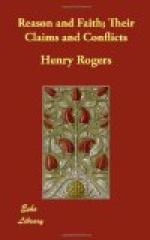The remarks that have been made are not uncalled for in the present day. For unfortunately, it is now easy to detect in many classes of minds a tendency to divorce Reason from Faith, or Faith from reason; and to proclaim that ‘what God hath joined together’ shall henceforth exist in alienation. We see this tendency manifested in relation both to Natural Theology, and to Revealed Religion. The old conflict between the claims of these two guiding principles of man (in no age wholly suppressed) is visibly renewed in our day. In relation to Christianity especially, there are large classes amongst us who press the claims of faith so far, that it would become, if they had their will, an utterly unreasonable faith; some of whom do not scruple to speak slightingly of the evidences which substantiate Christianity; to decry and depreciate the study of them; to pronounce that study unnecessary; and even in many cases to insinuate their insufficiency. They are loud in the mean time in extolling a faith which, as Whately truly observes, is no whit better than the faith of a heathen; who has no other or better reason to offer for his religion than that his father told him it was true! But this plainly is not the intelligent faith which, as we have seen, is everywhere inculcated and applauded in the Scriptures; it is not ’that faith by which Christianity, appealing In the midst of a multitude of such traditional religions, to palpable evidence addressed to man’s senses and understandings (in a way no other religion ever did) everywhere destroyed the systems for which their votaries could only say that their fathers told them they were true. And yet this blind belief in such tradition, many advocates of Christianity would now enjoin us to imitate! It might have occurred to them, one would think, that, on their principles, Christianity never could have succeeded; for every mind must have been hopelessly pre-occupied against all examination of its claims. It is, indeed, incomparably better that a man should be a sincere Christian even by an utterly unreasoning and passive faith (if that be possible), than no Christian at all; but at the best, such a man is a possessor of the truth only by accident: he ought to have, and, if he be a sincere disciple of truth, will seek, some more solid grounds for holding it. But it is but too obvious, we fear, that the disposition to enjoin this obsequious mood of mind is prompted by a strong desire to revive the ancient empire of priestcraft and the pretensions of ecclesiastical despotism; to secure readmission to the human mind of extravagant and preposterous claims, which their advocates are sadly conscious rest on no solid foundation. They feel that reason is not with them, it must be against them: and reason therefore they are determined to exclude.




